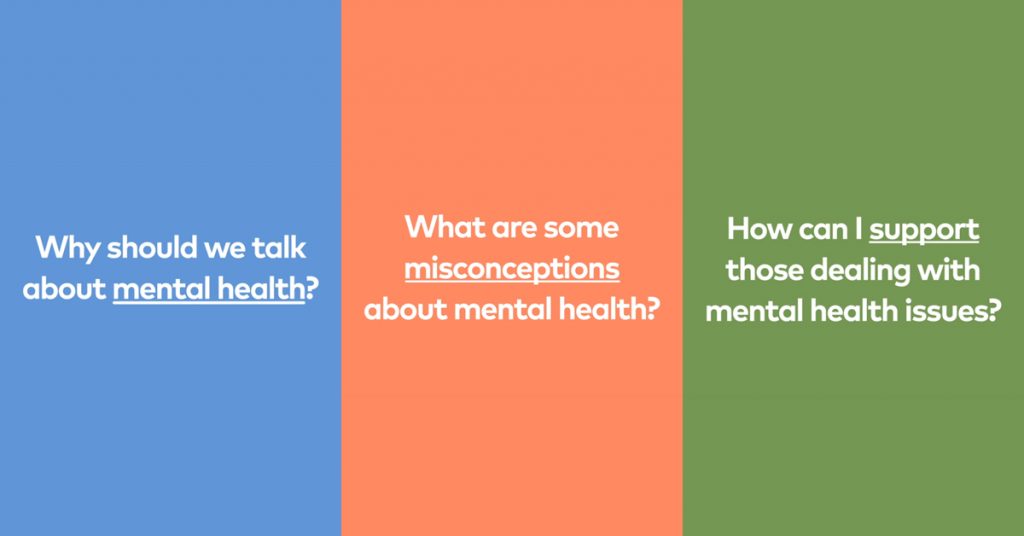Mental health: talking about how to break the stigma and take action

By Natalie Leung
Jan. 29, 2020 – Mental health affects everyone in their own way and it can often be difficult to talk about. For Bell Let’s Talk Day, we wanted to open up the conversation to see how everyone can help break the stigma and support those dealing with mental health issues or illnesses. Here is what some of our people had to say.
- Monica Figueiredo
Advanced Practice Clinical Educator, Adult Inpatient Mental Health, St. Joseph’s Health Centre - Deane O’Leary
Team Leader, Community Connections and STEP Program, St. Michael’s Hospital - Ronald Perinpanayagam
Clinical Resource Coordinator – Intake and Family Guidance, Scotiabank Learning Centre and Adult Day Program, Providence Healthcare - Madeleine Ritts
Team Leader, FOCUS Team, St. Michael’s Hospital
Why do you think it’s important to talk about mental health?
Figueiredo: The most important reason to talk about it is to decrease stigma. As individuals, we are a combination between our physical health and our mental health. If we don’t start talking about it, people aren’t going to take the time to address and care about their mental health, which eventually can lead to mental illness.
Perinpanayagam: Speaking openly about mental health helps us create a more compassionate community. It can be difficult to notice when someone is struggling, so reminding each other that “it’s OK to not be OK” can make a powerful difference. My hope is, the more we talk about mental health, we will continue to dispel its stigma and hopefully encourage individuals to seek help.
O’Leary: It’s important for us to give voices to people whose voices are often silenced. Those experiencing homelessness, poverty, and people who are racialized don’t always feel welcome to participate in the broader discussion around mental health and their care. We really need to make sure they are heard at all levels.
What are some misconceptions about mental health?
O’Leary: People might assume that access to mental health support is equal and accessible by everyone. I don’t think it is true. Certain groups are able to access mental health services easier than others. In my experience, a mental health crisis and the care someone receives looks a lot different for someone with socioeconomic privilege compared to someone who has no fixed address.
Ritts: Another misconception is that mental health is exclusively improved by health institutions. There are many socioeconomic determinants that affect mental health. For example, if someone has precarious employment and inadequate benefits it can have a big impact their mental health. Employers, and legislators, can do a lot more to support the mental well-being of workers through fair wages, equitable contracts, and positive work environments.
What actions can people take to support those dealing with mental health issues?
Figueiredo: It’s important for us to be good listeners, and that we don’t judge because we don’t know what their personal struggles are or what they’re dealing with or how they are dealing with them. Someone who has mental illness needs someone to listen to them and make them feel valued and heard.
Ritts: There is a lot of work to be done if we ever hope to ensure universal access to quality mental health care services. The more that people can advocate and organize with their friends, co-workers, and as communities, the more change we will see. There are lots of different platforms and networks people can engage to see this happen.
O’Leary: People can demand more from governments for funding as there is a disparity between mental health funding and physical health funding. People can also demand more from their employers for resources to keep themselves well.
Being a caregiver can be challenging, and it can have an impact on mental health. Do you have any advice for caregivers?
Perinpanayagam: While each caregiver’s experiences and challenges differ, it’s vital for everyone to feel supported during their journey. At Providence, in collaboration with the Alzheimer’s Society of Toronto, we offer numerous workshops on joy, resilience and coping – in addition to dedicated support groups for caregivers of persons with dementia. Our attendees find that these events are cherished opportunities for socialization, rejuvenation, laughter and relaxation. My advice to caregivers would be to build time into their day to engage in experiences like these that are meaningful and uplifting. To learn more about the programs at the Scotiabank Learning Centre, visit our website or call 416-285-3666 ext. 4177.
If you or someone you know is experiencing a mental health crisis, please call 911 or visit your nearest emergency department.
